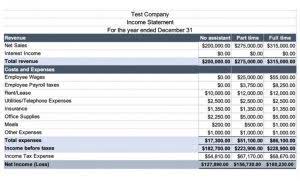
First, establish good accounting hygiene when it comes to your rental property record-keeping, then use accounting software to help automate most of your finances. Next, your banking needs to be built out to optimize for the above real estate accounting best practices. In the realm of real estate, strict regulations necessitate meticulous adherence to a multitude of legal and tax prerequisites. By maintaining thorough and accurate financial records, real estate entities can navigate the complexities of the regulatory landscape with enhanced diligence and confidence. Real estate agencies can use real estate accounting software options to manage their accounting deals and real estate deals effectively. Many real estate companies also integrate property management software into their accounting platform to meet their bookkeeping needs and comply with real estate tax laws.
Benefits of Specialized Real Estate Accounting Systems
- Real estate accounting is a specialized branch of accounting tailored to the property sector.
- Recording the purchase of a property could be a full article all on its own.
- This practice helps catch mistakes early on and ensures that your books remain accurate and up-to-date.
- Bookkeeping needs to factor timeframes, depreciation methodology (straight-line most commonly), allowed deductions, and recaptured depreciation if sold.
- During tax time, having well-organized financial records can save you time and stress when calculating real estate tax.
- Regular reviews ensure that all accounts are accurately reconciled.
Regular reviews ensure that revenues and expenses are accurately recognized. Training sessions can help real estate professionals grasp the nuances of this method. Ultimately, accrual accounting offers a transparent and accurate view of a property’s financial performance. They also undertake capital expenditures to enhance property value. Real estate accounting offers tools to track these expenses and optimize returns. Regular financial reviews provide insights into spending patterns and potential areas of savings.

Rental property accounting apps
Regular reviews, performance analysis, and market trend evaluations are key components. Training sessions and advanced software solutions can further enhance investment optimization. For real estate professionals, optimizing investment returns is a core skill. Accurate optimization ensures that businesses make informed investment decisions. It’s a critical aspect of successful real estate accounting that supports financial growth.

Itemize All Incoming and Outgoing Transactions
- Revenue — often our favorite and most straight forward category — represents income generated from business activity.
- We hope this short guide gives you the tools to make an informed decision regarding your real estate business’s accounting practices.
- Financial analysis offers insights into the financial position and performance of a property.
- Juggling multiple properties and owners adds layers of complexity to bookkeeping.
- Effective organization of financial documents facilitates quick access and efficient management, especially during tax season or when financial statements and reports are needed.
- Accounting is an important part of every industry and real estate is no exception.
Real estate accounting software offers tailored solutions for brokers, ensuring transparent QuickBooks commission management. Regular financial reviews help brokers understand their income patterns and potential areas of growth. Training sessions and workshops further refine their accounting skills. Moreover, clear financial protocols ensure that commissions are managed ethically and transparently. For brokers, a robust accounting system is foundational for trust, reputation, and business growth.
Accurate and detailed records are crucial for backing up your deductions and staying compliant with tax rules. Organize your receipts and clearly document the business purpose for each expense. Becker is here to help you answer your questions surrounding this accounting specialization and share the knowledge you need to succeed as a real estate accountant. Stessa helps both novice and sophisticated investors make informed decisions about their property portfolio. Reports created from a real estate bookkeeping system can also be generated based on a specific date range, such as monthly, year-end, or trailing 12 months. Form 8912 is designed for taxpayers to claim credits for holding qualified bookkeeping for realtors tax credit bonds, such as clean energy, school construction, or other infrastructure-focused bonds.

Tracking Income and Expenses for Real Estate Agents
Accounting offers real estate professionals a range of https://www.bookstime.com/ tax deductions that can help reduce taxable income. Understanding IRS guidelines is key to maximizing deductions for expenses such as mortgage interest, property taxes, and depreciation. Utilizing software can help track expenses and ensure compliance with tax laws.
How are federal payroll taxes paid?
While most focus generally lies on federal and state income taxes, there’s also a third aspect—payroll taxes. My exclusive membership community for intermediate and advanced rental investors. Join BiggerPockets and get access to real estate investing tips, market updates, and exclusive email content. However, take note that multifamily properties are considered one property. You may have 20 units, but if that is made up of five fourplexes spread across town, you only need five accounts.

Advanced real estate accounting software further streamlines their financial processes. Continuous professional development ensures that REITs remain compliant with evolving regulations. Ultimately, accurate and transparent accounting is foundational for REITs to maintain stakeholder trust and drive investments.

Regular financial reviews help these entities align their real estate investments with broader financial goals. Advanced analytics and insights, often powered by artificial intelligence (AI), further refine their investment strategies. Moreover, institutional investors often collaborate with real estate accounting professionals to ensure compliance and accuracy. Such collaborations underscore the importance of real estate accounting in large-scale property investment. Accounting is an important part of every industry and real estate is no exception.
